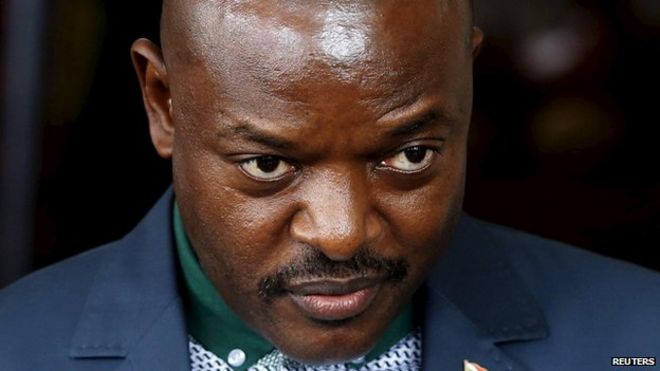- 7 hours ago
- Africa

Burundi's President Pierre Nkurunziza has said his country faces a specific threat from the Somali Islamist movement al-Shabab.
He was appearing in public in the capital Bujumbura for the first time since a failed coup bid against him was launched on Wednesday.
Mr Nkurunziza made no mention of the coup attempt, which came after weeks of sometimes violent protests against him.
On Saturday 18 people appeared in court on charges of helping the coup bid.
The alleged ringleader, Godefroid Niyombare, is still on the run.
Activists are planning more protests for Monday against Mr Nkurunziza's decision to seek a third term in office in elections due next month.
The BBC's Karen Allen, who is in Bujumbura, says the president's claims have been met with scepticism from many, who fear they could provide a pretext for the security services to crack down hard on Monday's demonstrations.
On Saturday, our correspondent saw evidence of a retaliatory attack at a hospital where soldiers involved in the coup were being treated. Three soldiers were taken from the building and bundled into a police van.
Mr Nkurunziza was out of the country when military officers launched their coup bid against him on Wednesday. He returned on Friday after forces loyal to him had regained full control.
The president said he came to his office to speak on the telephone with the leaders of Kenya and Uganda regarding a specific threat from the Islamist group al-Shabab.
Al-Shabab, which is battling the UN-backed government in Somalia, has carried out a string of attacks in neighbouring Kenya and is allied to al-Qaeda.
The UK Foreign Office and the US state department say al-Shabab has threatened to carry out attacks in Burundi because of its role in the African Union-led peacekeeping mission in Somalia.
The US has advised its citizens to leave the country because of the deteriorating political situation, and had previously warned about the threat from al-Shabab.
Burundi: Key facts
The country is facing its worst turmoil since the 12-year civil war ended in 2005
- 10.4m population
- 50 years - life expectancy for a man
- 2nd poorest country in the world
- 85% are Hutu, 14% Tutsi
- 300,000 died in civil war

No comments:
Post a Comment